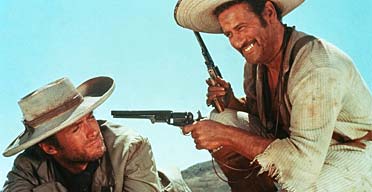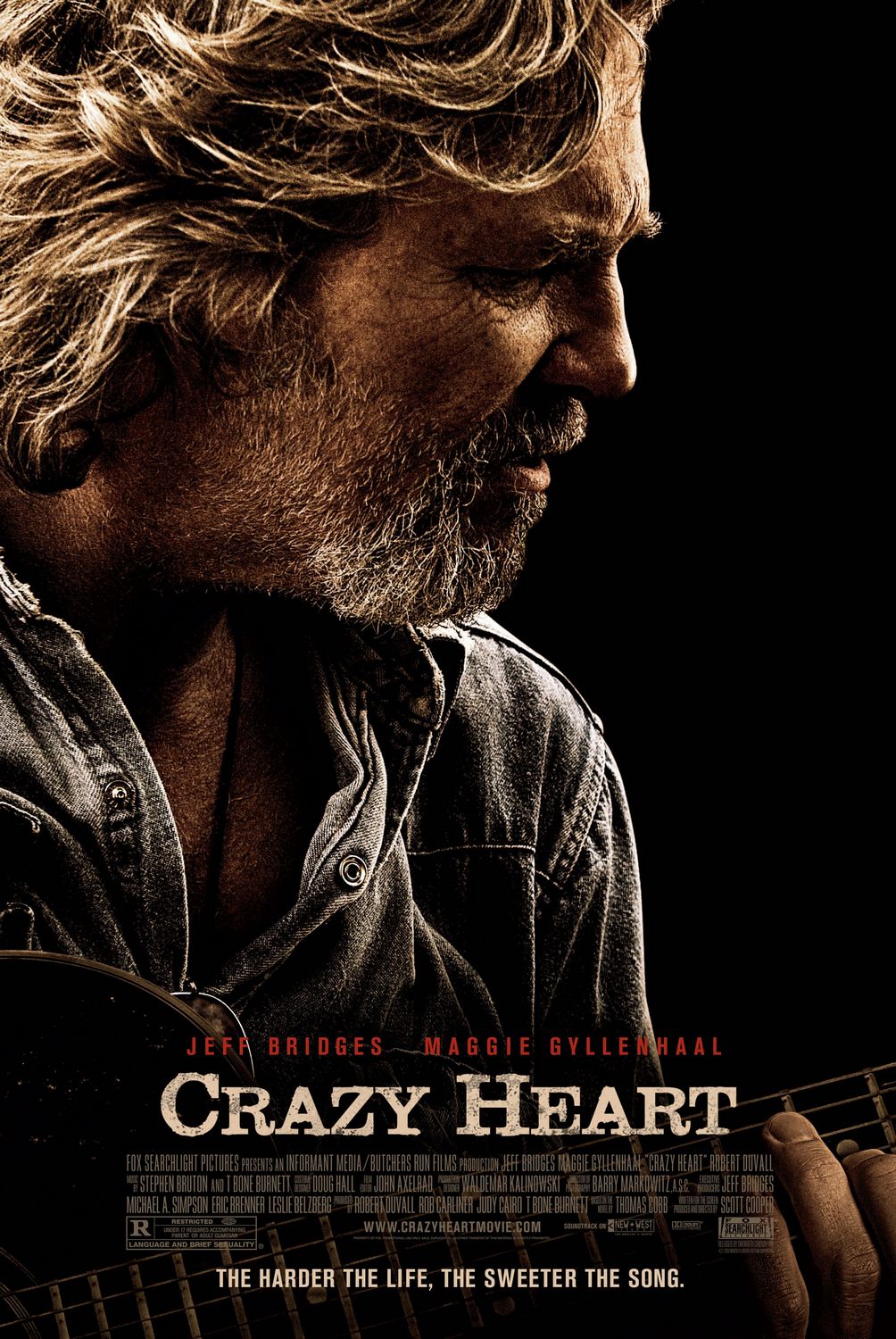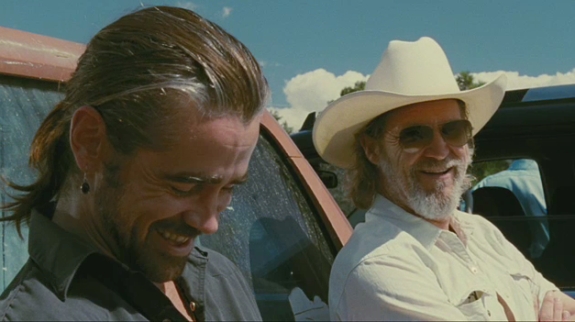

Director: Darren Aronofsky, 2010. (R)
"I want to be perfect," says Nina (Natalie Portman,
Star Wars 1: The Phantom Menace), the pretty ballerina in the New York City ballet company. She is the White Swan and the heart of this film. And perfectionism is one of the themes of the film, along with predominance and paranoia.
Aronofsky uses Tchaikovsky's "Swan Lake" as the balletic and musical background here. The troupe's artistic director, Frenchman Thomas Leroy (Vincent Cassel), wants to bring a new spin, focusing on the black swan rather than the white. Of course, both swans are one and the same, simply being two sides of one person: grace and innocence compared to guile and sensuality.
An early scene sets the tone. When Thomas declares his old prima ballerina Beth (Winona Ryder) will retire, the doorway opens for a new star. And Nina wants to be that star, the white/black swan of the title. When she approaches him for the part, he tells her: "The truth is when I look at you all I see is the white swan. Yes, you're beautiful, fearful, and fragile. Ideal casting. But the black swan? It's a hard job to dance both." Nina softly replies, "I can dance the black swan, too." Thomas: "Really? In 4 years every time you dance I see you obsessed getting each and every move perfectly right but I never see you lose yourself. Ever! All that discipline for what?" Whispering, Nina comments, almost to herself, "I just want to be perfect."

Here is the core value of the little ballerina. The princess seeks perfection. Some of us are like that, too. We want to be perfect, and are scared we might fail. But in reality, we will probably not be perfect. Life usually disallows this. Only Jesus was perfect. This value, this goal tends to limit not free us. As Thomas put it, "Perfection is not just about control. It's also about letting go. Surprise yourself so you can surprise the audience. Transcendence! Very few have it in them." When we let go of ourselves, remove the restraints and attack our job with gusto, willing to make a mistake along the way, we will surprise ourselves. If we realize that our imperfections are more than made up for by God's immeasurable grace (2 Cor. 12:9), then we can do great things that we cannot do in our "imperfect perfection" (Phil. 4:13).

Winning the role, Nina has the white swan down but must master the black swan. Promoted to principal dancer, she immediately experiences the backstabbing and trash-talking from the other dancers. Only the new dancer from the West Coast, Lily (Mila Kunis,
The Book of Eli), offers support and friendship. Even this is questionable, though, since she is a competitor for the lead role as her black swan dance is flowing and seductive.
The other main character is Nina's mom, Erica (Barbara Hershey). A former ballerina, she exerts a suffocating control over her daughter, managing and manipulating her like a child. Indeed, Nina's room in their apartment resembles a child's bedroom, down to the single bed and stuffed animals. Her appearance, like her relationship to Nina, is chilling and creepy.
Control is the second theme. Erica's external control over Nina mirrors Nina's internal control over herself. Her mom won't let her go free and she holds herself back. Control, in its place, is a good thing. Total lack of control leads to anarchy and chaos. But too much control limits our creativity, stifling our expressions of feeling and our freedom. The right amount of control is freeing, providing sufficient limits to bring focus while giving us room to grow and perform.

An example of this can be found in the Old Testament, though it is widely misunderstood. God provided the law and the ten commandments to his chosen people (Exod. 20) not as a form of over-control, but as a means to delineate the freedoms they had. This was a gift of grace, though when the people tried to earn their redemptive relationship with the Lord by rule-keeping, they missed the point and missed the blessing. These laws defined boundaries, allowing all else.
Like his last film,
The Wrestler,
Black Swan is intense, even disturbing, with its infamous Portman-Kunis kiss and lesbian love scene, certainly deserving its R-rating. It reminded me some of David Lynch's
Mulholland Drive, being both a drama and a paranoid thriller. Visceral and cerabral, it veers into psychological horror in places. Freely using jittery hand-held shots, he pulls the audience into the growing tension, making us feel as uncomfortable as Nina herself.
Aronofsky pulls outstanding acting performances from his cast here, as he did in his earlier film.
The Wrestler earned Mickey Rourke an Oscar as Randy the Ram, and here Natalie Portman gives a stunning turn as a young woman spiralling into paranoia. She has already won a Golden Globe for this role, and seems a sure bet for the Best Actress Oscar this March. And the name cast around her also give fine performances.
As the pressure to perform as both swans mounts, Nina begins to descend into the dark depths of breakdown. The obsessions of her mother and the expectations of Thomas cause her to actively seek the dark side of the swan. To dance the black swan, she must
become the black swan. Lily's friendship, too, borders on recklessness. Nina's fall from the grace of the white swan into the shadow of the black swan is accompanied by paranoid visions and feelings: "She wants my role. . . She's after me. She's trying to replace me!" She cannot see reality, only delusions.
Nina demonstrates the truth that in striving to achieve our goals, we risk losing a part of us that we might never get back. Like Randy the Ram, both wrestler and ballerina desired the glory of the spotlight at any cost. The tired and worn-out macho man and the young and ambitious petite princess echo one another. Both unknowingly risk their very selves for a passing prize.
Aronofsky also underscores the duality of humanity. We think we are pure and innocent, the white swan. We want to be that person. But we are not. The Bible says, "the heart is deceitful above all things and beyond cure " (Jer. 17:9). It paints an ugly picture of the depravity of mankind: "The LORD saw how great the wickedness of the human race had become on the earth, and that every inclination of the thoughts of the human heart was only evil all the time" (Gen. 6:5). Some, on the other hand, want to discard any trace of innocence and be the rebel, giving into the allure and excitement of the dark side of our nature, the black swan. That is easy to do, since our natural tendency is to sin. But we still bear the image of God (1 Cor. 11:7). Tarnished and distorted though it is, we are still his creation. In a sense, black swan and white swan live together in each person.
Ultimately, though, God calls out to us offering redemption and re-creation as the true white swan, fashioned after the second Adam, Jesus Christ (1 Cor. 15:47). It is our choice if we would pursue the recklessness of the black swan that will consume and destroy us, as it did Nina; or if we will paradoxically release control and let go of perfectionism and find freedom and completion in Christ. Which swan will you be?
Copyright ©2011, Martin Baggs


 When the Russian revolution leaves Igor penniless and a refugee in France with his wife and four children, Coco invites them to stay at her mansion. While there, she seduces him and begins an affair, right under the nose of his wife Katarina (Elena Morozova).
When the Russian revolution leaves Igor penniless and a refugee in France with his wife and four children, Coco invites them to stay at her mansion. While there, she seduces him and begins an affair, right under the nose of his wife Katarina (Elena Morozova). There is little here to interact with. Perhaps, the film reminds us that our relationships deserve as much if not more than our vocation or work. For most of us, our work will eventually disappear and we will be forgotten laborers. A few will produce goods, inventions or creations that will carry our name forward to the world. But they are rare; they are like Coco and Igor. The rest of us must make sure that our love is not passionless, our relationships are not mechanical. We are imbued with the mark of our maker, the image of God (Gen. 1:26), and he made us for love and relationship (Mk. 12:30-31). Let's not waste this. For that matter, let's not waste time watching Coco and Igor waste their time! Do yourself a favor: spend time with your spouse or loved one, not with this film!
There is little here to interact with. Perhaps, the film reminds us that our relationships deserve as much if not more than our vocation or work. For most of us, our work will eventually disappear and we will be forgotten laborers. A few will produce goods, inventions or creations that will carry our name forward to the world. But they are rare; they are like Coco and Igor. The rest of us must make sure that our love is not passionless, our relationships are not mechanical. We are imbued with the mark of our maker, the image of God (Gen. 1:26), and he made us for love and relationship (Mk. 12:30-31). Let's not waste this. For that matter, let's not waste time watching Coco and Igor waste their time! Do yourself a favor: spend time with your spouse or loved one, not with this film!




























 Talking to Silvanito (Jose Calvo), the local bar owner, the cowboy discovers this is a town with two bosses. At one end of town are the Baxters, headed up by John Baxter (Wolfgang Lukschy), while at the other end are the Rojos, the crueler Mexicans. Sandwiched in between, the townsfolk live in fear, while the man making money is the undertaker. The cowboy decides he can get rich in this town by working for both sides, serving two bosses.
Talking to Silvanito (Jose Calvo), the local bar owner, the cowboy discovers this is a town with two bosses. At one end of town are the Baxters, headed up by John Baxter (Wolfgang Lukschy), while at the other end are the Rojos, the crueler Mexicans. Sandwiched in between, the townsfolk live in fear, while the man making money is the undertaker. The cowboy decides he can get rich in this town by working for both sides, serving two bosses.














